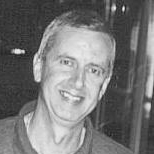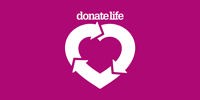(Following are excerpts from a newsletter that Andy King sent to his friends overseas. Thank you Andy for allowing Sue Tamblyn to pass this on for our readers. Editor)
G'Day
The Biggest events in the last two years have of course been the birth of our daughter Emma Claire and the matter of my small and trifling lifesaving operation.
Bloody Hell! A Transplant!
So, I guess a bilateral (double) lung transplant came as somewhat of a surprise to most of you! It's been on the cards for some time and we had been planning our lives accordingly. Our first serious hint came way back in July 2000 when, having moved to Sydney, I introduced myself to the local Consultant to touch base with him regarding my health. Having tested my lung function he broke the news that at under 30% of normal I met the criteria for one.
The fact that with my Condition I could one day require a lung transplant was not news to me, however the fact that I was eligible there and then was. This was quite a shock to Jo and I, and indeed to my UK Consulting team too (Again, that I had a Consulting team in the UK might be a surprise to some; such subterfuge! Explains my penchant for flu jabs and keeping warm etc. eh?).
Now I had noticed whilst climbing mountains in Scotland earlier in 2000 that such an activity was a tad challenging, but hardly cause for major surgery. It would seem that presented with me, without knowing my history in detail, the chap from Sydney leapt to the conclusion that I had suffered a catastrophic decline; not really the case, rather that I had been able to cope extremely well with such a low lung function, though there probably had been a significant drop in the twelve months before coming to Australia.
Anyway, we didn't like him much, and when we moved to Melbourne we got on with the team much better; which was a good thing really because we would come to rely on them very heavily.
So as time passed my lungs gradually got worse. Sydney wasn't good for them, very humid, crap job, long hours. The opportunity arose to move to Melbourne to join Jo's parents' family business as their CFO. We leapt at it; however it was complicated by my visa, which was specific to having to be transferred to an intermediary company. The health requirements meant that this was a protracted process and took several months to go through.
We spent fifteen months in Sydney, were there for the Olympics, and, although I love the City we were glad to be moving. Melbourne is great place to live, better than Sydney in my opinion; except for the lack of icons such as the Harbour, the Opera House and the Bridge, though the "G" might come close. Melbournians have an envious sibling relationship with Sydneysiders in much the same was as Mancunians and Londoners; each "knowing" that their city is better. Melbourne has the Grand Prix, the International Comedy Festival, the Yarra Valley, decent roads, the MCG, decent climate, I could go on, just plonk in something like the Opera House and it would win.
The Saga of the Visa
The next big issue was for me to becopme properly eligible for the operation. Though I had yet to reconcile myself that I was ready for it I would have to change my visa status.
It wasn't until May the next year that, after supplementary evidence, much worrying and the help of a federal MP, that I was granted provisional permanent residence.
Decline
Life was becoming harder. My lung function was now hovering at 20%. I couldn't walk far without stopping out of breath, I was constantly tired, I had lost a lot of weight, and (still) had an awful cough. I was still working full time and attending the gym, but it was hard work. There is a radio advert here at the moment for quitting smoking which gives quite a good analogy and is in reference to the final stages of emphysema (which I don't have); breath in - all the way, then when you can breath in no more, force a bit more in. Then breath out just that last bit. Force in that last bit again and so on. Difficult? Another way is to only take one breath in five.
The time had come for a decision. In June we decided to apply to go on the list and the "Work up" was booked for July; this is where one spends three days in Hospital and is subject to a plethora of tests. I was suffering from (another) chest infection at the time and my lung function dipped to only 16%. I had blood tests, x-rays, ct. scans, dexascans, ultrasounds, more x-rays and more blood tests. Absolutely fascinating. On the tenth of August the results of the work up came through and we met with the team
To our immense relief I was suitable for transplant and went on the list.
By then Jo was almost nine months pregnant, sometimes one is lucky and receives "the call" immediately and it was a strange feeling wanting the call but perhaps not until Jo had given birth! Emma was born at 15:10 on 18th August 2003 in Melbourne. By now I was on Oxygen pretty much all the time either as a portable cylinder or an Oxygen machine at home; there are not many births where the Father and not the Mother is on Oxygen!
The next five months saw more chest infections and hospitalisation. I was attending the pre-transplant gym three times a week. Research has shown that post transplant prognosis is vastly improved if the strength and fitness can be improved prior to the operation.
The sessions were conducted in the hospital under the supervision of qualified physios, most of the patients exercised on oxygen but even with this all of those exercising could be a theoretical "code blue" - a code blue is called when a heart attack happens, or blood oxygen saturation is below 90% (normal is 98-100%) and the crash team arrive with the paddles! My sat's hovered at 88-89% resting and plummeted to the seventies on exercise, even on oxygen and my resting pulse was about 120. All in all somewhat of a wreck!
The Call
The call finally came Jo took it, I knew it to be the one as she was crying and smiling at the same time. I took a shower with special antiseptic soap and then we made our leisurely way in to the hospital to be prepped. We arrived around 10ish and the circus began. The staff on ward 5E were really pleased to see me, congratulating us on our good fortune on getting a good match.
A nice young nurse shaved my chest and gave me my first doses of immunosuppressant medication. The registrar arrived checked me out; I asked her if I'd be able to play the flute after the operation, she said she didn't see why not and I said that was great because I couldn't before (Ho Ho!). Jo's family arrived around midday having flown at short notice from Queensland. (my mother-in-law) asked that as I'd be under for some time had I considered asking for some cosmetic surgery as well.
Much hilarity! Unbeknown to me there were some last minute checks on the donor that were causing some concern to the team; organs are not dished out on a first come first served basis, rather blood types and tissue types are matched (these must be correct for major rejection to be avoided) and antibodies present are analysed; mismatches here can cause infection problems. It is not uncommon for people to be called in, going through all the emotions of that time, only for one or other factor to result in someone else receiving the organs.
We had been warned that there may be several false alarms. The op' was scheduled to begin at 2pm, but was delayed and it was not until half three that I was wheeled to theatre with Jo and Emma at my side. I still maintain that I had the easiest part, and always had (and will have). Jo had to watch my steady decline, was aware of all the stats on my life expectancy with and without the op, and for the next 6 to 8 hours would have to endure the torture of complete and utter helplessness. All I had to do was lie back and drift off to sleep.
Pure Theatre
There was more prep in theatre. I had an epidural put in, I was rather keen that it would be a good one given the size of the cut I was about to obtain. Apparently my back was more gristly than most with the anesthetist all but putting his knee into my back as my shoulders were held to give purchase from the front.
For the medically interested the epidural was beefed up by the addition of adrenaline, a new technique apparently. I had several 'lines' inserted (two arterial in my wrists, six venal in my neck, put in for sampling blood gasses, administering drugs etc. There were others but I forget the detail), and electrodes on my chest for monitoring heartbeat etc.
My normal social worker, a fantastic lady, was unfortunately on holiday and her reserve decided to pay a visit. Nice thought but she was rather embarrassing, lord knows what the theatre staff thought, as she asked if I'd like to try some relaxation techniques; frankly I was perfectly relaxed and was far more interested in the asking the surgical team about what was going on than joining in calming mantras.
I thanked her for her concern, she left and I could get on with asking about the most expensive machine in the hospital (in case the administrator came round) or the one that goes ping (the team were familiar with Monty Python and knew to what I was referring). Seriously, talking to the team was interesting and probably my way of dealing with the situation. I talked with one of the doctors, who was a Brit. He offered some tax advice (get some) and chatted about the Old Country until just after 4pm when I was put under full antithesis.
For the squeamish; skip this paragraph!
The incision, contrary to popular belief, is not up and down the sternum as it is for a heart, but stretches from one armpit to another under each pectoral and is known as a 'clamshell'. The arms were tied as on a rack, literally, and pulled, hinging on the spine the opening is clamped open. One lung was clamped off, deflated and removed. A new one was inserted, sewn in and partially inflated and began to breath for me. The other one was then deflated and removed, the second new one sewn into place and it was partially inflated and began breathing for me. All surgical tools are accounted for and I was closed up and stapled together (82 held the wound together to be removed a few days later, permanent wires held together my sternum where it had been severed). Apparently the op finished at half 11 in the evening I am told and I was wheeled to ICU.
Recovery
Jo came and visited at about midnight to be presented with what looked like a dead body, yellowish grey from the iodine and cold as body temp was reduced to control bleeding. I first came to at about 6am. Intubated, communication was difficult, and I had to use a pen and paper which was challenging. The tube would be removed once it was certain that I could breath on my own having been taken off the respirator earlier in the morning. From this first moment of consciousness on I can truly say that my recovery has been nothing short of miraculous.
The tube came out later in the morning and I could speak. I could also look down and see my new trophy etched across my chest. I could also breath. By 4pm in the afternoon I was sitting NEXT to my bed supping chicken soup. Incredible. The ICU team joked that I was an imposter as I was alert, doing well, my sats were 97% and heartbeat 90. My visitors told me that my lips were pink again and not blue; I could see the difference in my nails which were now a healthy pink too. I spent 48 hours in ICU before I was moved to ward 5E.
This was very good going, I would have been out earlier but for some adverse liver function indicators. The lungs take time to inflate fully and where some notice a difference instantly I didn't. It was on day 3 that I noticed that I could talk for more than short bursts without gasping for breath. In fact I could talk and talk and talk!
Over the next week or so my progress was again excellent. My medication regime was impressive, about 80 tablets a day to start with, including some pretty strong pain relief. I was lucky to avoid major hallucinogenic side effects, though I did have the odd nightmare about falling asleep and stopping breathing, as if my new lungs needed my conscious thoughts to keep them breathing.
Going Home
After two weeks I was well enough to go home. Hospitals are all very well but they are full of sick people and are not the best place for an immunosuppressed person. The feeling of elation on the way home is something I will never forget, all the thoughts of what would now be possible, all the things that we would be able to do. To sleep in my own bed was fabulous too. The next morning Emma woke at 6:30, Jo got up to attend to her and emerged with Emma from her bedroom to discover me making us both a cup of tea. Unheard of at this time of the morning! Jo was used to knowing where I was, either where she left me or at the end of the tube connected to the oxygen machine. Now I was zinging everywhere.
My recovery continued with me surpassing milestones sooner than expected. I attended the post transplant gym and threw myself at the exercises; transplantees often get shin splints as calcium levels are depleted and exercise increases, the physio's worry about this like mother hens. I didn't get them.
My lung function steadily increased, my fitness level rose, my appetite returned with a vengeance. Prior to the op I weighed only 54 kg and I began to gain weight. I was off work for three months. My Progress was so good that after only 6 months I was able to take the family for a weeks skiing in New Zealand. Awesome fun it was too!
Today my lung function is 108% (population average is by definition 100%), I have put as much weight as my daughter now weighs (12.5kg), I am active and a new person. I'm down to a little under 40 pills a day and my scar is healing nicely - too nicely, how am I supposed to show it off if it has faded so? I am also very, very lucky.
Not all my friends in the pre-transplant gym made it. Someone lost their life to enable me to live, and their family suffered the loss of their loved one. In Australia the Donor's family has to consent to the donation, and I am of course deeply, deeply indebted to my Donor's decision to donate and to their family for their decision to consent. Before the transplant I was very coy about my condition; it was my business, no-one else's. Publicising such weakness may have lead to different treatment and my pride would not allow that (If I have a boil on my backside I'll sit down carefully!).
Post op - though things are different. Firstly it's so darn interesting, I think, that I want to share the experience. Secondly, and more importantly, the difference that it made in my life can also be made in others if more people go on organ donor registers and their family know their wishes. It is personal choice, but I am of course biased as to what choice should be!




